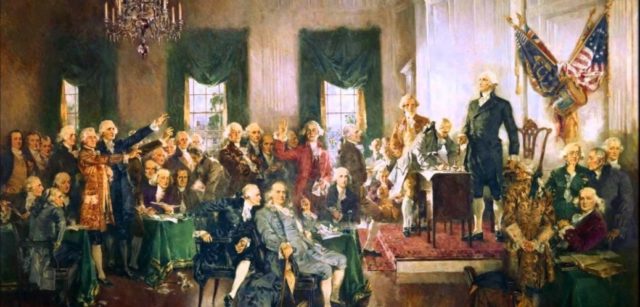 It was a news item that came and went with barely a ripple. And yet, it should have set off sirens and red-light alarms all across the country.
It was a news item that came and went with barely a ripple. And yet, it should have set off sirens and red-light alarms all across the country.
“America’s top liberal arts schools skip U.S. history,” the headline read. “Of the 29 top-ranked liberal arts colleges,” reported Fox News, “only the United States Air Force Academy, the United States Military Academy, and the United States Naval Academy require a survey course in American history.”
And why should the alarms have sounded?
Because it means that generations of students working their way through the upper reaches of the American educational system may be bypassing the one field of study which for over 200 years had succeeded in establishing two crucial cornerstones of the American legacy: it bonded us together as a nation, instilling in all of us a common heritage, a common body of tradition, and most important of all, a common set of proclaimed values; and it equipped us to exercise the responsibilities of active and responsible citizenship which was and is our only source of leverage in limiting the powers of central government.
It may well have been the single most powerful agent in fulfilling one of the historic American ideals: E Pluribus Unum, from many one.
It’s possible to master a wide variety of core studies along with all their derivatives, such as math, science, English, and world history, without understanding what the oft-referenced “exceptionalism” of the United States of America is all about.
But those studies do nothing in and of themselves to inspire in us the love of country and a deep appreciation of the words “one nation” as they appear in the Pledge of Allegiance.
Without a thorough background in American history and civics, it is all too easy to develop a decidedly negative perception of this country solely on the basis of the way it is portrayed day-to-day in the media, with its partisan differences and eruptions of ugly diatribe. But those who know our history and our democratic processes understand that such heated expressions of apparent discord strengthen rather than weaken our priceless constitutional rights of free speech and freedom of the press.
Worst of all, generations of parents who have blithely skirted the elective courses in American history that might have enabled them to appreciate what has been passed down to them lack the necessary breadth of knowledge to share it with their children.
Rising above diverse ethnicities, color, religion, and ancient generational loyalties, the study of American history and government defined us, and spelled out what we stood for. It brought us together under one flag, one overarching allegiance, and created a unity of purpose that marshaled the nation’s energy, courage, and sacrifice when needed.
The U.S. should properly be recognized as a multi-ethnic society rather than a multicultural society, one which exists under an umbrella-like inclusive universal monoculture consisting of historical values which solidly unify us, even as it harbors the ample diversity that characterizes and enriches its social makeup.
The bonding experience brought about by the awareness, appreciation and pride that are the positive byproducts of comprehending the implications of American history in all its dimensions is invaluable. Without it, the strains and cracks that are already becoming evident will eventually transform us into a largely fragmented society, divided into segments labeled by group identity, and reducing politics to constant intramural wrangling over the doling out of government favors.
Such a ruinous course will inevitably fracture beyond repair the once-great unified nation that offered freedom and equal opportunity, and the prospect of life, liberty, and the pursuit of happiness, to those willing to accept and exercise the personal responsibility required to fulfill that lofty promise.
Written by Stan Cohen and published by National Association of Scholars ~ September 23, 2014
 FAIR USE NOTICE: This site contains copyrighted material the use of which has not always been specifically authorized by the copyright owner. We are making such material available in our efforts to advance understanding of environmental, political, human rights, economic, democracy, scientific, and social justice issues, etc. We believe this constitutes a ‘fair use’ of any such copyrighted material as provided for in section 107 of the US Copyright Law. In accordance with Title 17 U. S. C. Section 107, the material on this site is distributed without profit to those who have expressed a prior interest in receiving the included information for research and educational purposes. For more information go to: http://www.law.cornell.edu/uscode/17/107.shtml
FAIR USE NOTICE: This site contains copyrighted material the use of which has not always been specifically authorized by the copyright owner. We are making such material available in our efforts to advance understanding of environmental, political, human rights, economic, democracy, scientific, and social justice issues, etc. We believe this constitutes a ‘fair use’ of any such copyrighted material as provided for in section 107 of the US Copyright Law. In accordance with Title 17 U. S. C. Section 107, the material on this site is distributed without profit to those who have expressed a prior interest in receiving the included information for research and educational purposes. For more information go to: http://www.law.cornell.edu/uscode/17/107.shtml
